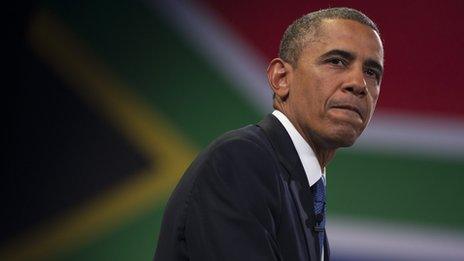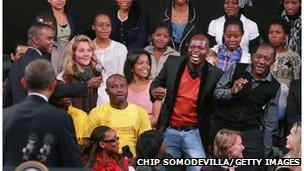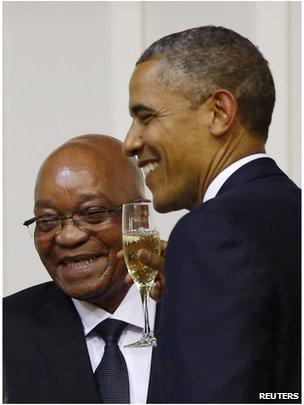No easy ride for Barack Obama in South Africa
- Published

Some commentators in South Africa have accused Barack Obama of not doing much for the continent, even though his father came from Kenya.
The visit of a black US president to the South African township of Soweto, heart of the struggle against white minority rule, would once have been a truly historic event, attracting massive crowds.
Instead Barack Obama was met largely with indifference. Only a small group of demonstrators protested against US foreign policy.
Mr Obama did not see them himself, however, as South African police fired stun grenades and rubber bullets to disperse them before his motorcade arrived at the University of Johannesburg, where he held a question-and-answer session with a handpicked audience from across Africa.
One reason for the prevailing apathy is that South Africa has now grown used to seeing a black leader at the White House.
One young South African told me he had celebrated Mr Obama’s first election victory but “now we have seen that he is no different to other US presidents”.
Police fired warning shots during a protest outside the University of Johannesburg's Soweto campus where President Obama was visiting
“The US still imposes itself on other nations,” he said, pointing to the US involvement in the toppling of South African ally Col Muammar Gaddafi in Libya.
Among the few people who did go along to cheer Mr Obama was businessman Alex Motloung, 40.
He waited for an hour to see the US president pass through Soweto’s Pimmville district, home to the University of Johannesburg.
He was disappointed, though, as the presidential motorcade went by at such a speed that he could not make out any of the faces inside the vehicles.
In a joint news conference with the US leader, President Zuma compared Mr Obama to Nelson Mandela, the “father of the nation,” whose ill health is dominating the thoughts of all South Africans at the moment.
Mr Zuma noted that both were the first black presidents of their respective countries, and so carried “the dreams of millions of people in Africa and the diaspora, who had previously been oppressed”.
Mr Motloung noted that in one way, Mr Obama had achieved something even more impressive than Madiba, as the anti-apartheid hero of is fondly known here.
“What he has done shows that nothing is impossible - even a country with a white majority can vote for a black person.
“This is what we want in South Africa - when people can be judged on their ability and not the colour of their skin - that is Madiba’s dream.”
No comparison
But elsewhere in Pimmville, just over a small kopie (hill) from the university, there was less excitement about the presidential visit. Life carried on pretty much as normal.
Couples were taking an afternoon stroll before the warm afternoon sunshine turned into the cold night of the southern hemisphere winter, while groups of young men were drinking outside taverns or getting their hair cut at outdoor barbers.
Law student Ntuthuko Nzimande-Dlamini, 24, said you could not compare Mr Obama to Mr Mandela, who had spent 27 years in prison for his opposition to white minority rule.

Some of the young Africans invited to take part in Mr Obama's "town hall" meeting were excited to be there
Lerato Mahasha said she was excited by the visit of the US president but was annoyed by the security measures.
The roads leading to the nearby university had all been closed, leading to enormous traffic jams in the area.
While President Zuma began his comments by praising Mr Obama, he also publicly raised the foreign policy differences between the global superpower and its African counterpart.
He noted that the rise of Islamist militants in Mali and neighbouring West African countries was a result of Col Gaddafi’s fall from power.
Playing catch-up?
Well-armed ethnic Tuareg fighters returned home from Libya and immediately resumed their rebellion, which was then hijacked by groups linked to al-Qaeda.
Some commentators in South Africa have accused Mr Obama of not doing much for the continent, even though his father came from Kenya.

Jacob Zuma did not shy away from the foreign policy differences between himself and Mr Obama
Some say that China is now more important to Africa than the US and Mr Obama was asked whether the US was now playing catch-up.
He replied that he welcomed other countries’ involvement in Africa, but he implicitly criticised China’s involvement. He urged the continent’s leaders signing agreements to “make sure it’s a good deal for Africa”, for example by making sure the jobs and profits created go to Africans, not foreigners.
The hundred or so “NoBama” protesters outside the university also condemned US policy in the Israel-Palestinian dispute and the continued detention of prisoners in Guantanamo Bay.
Outside Nelson Mandela’s former home in Soweto, among the street vendors selling Mandela T-shirts and visitors queuing to tour the historic building, there was also a small group of protesters, urging President Obama to help them “return to a free Zimbabwe”.
One of the protesters, Lucas Uriyanga, said: “Obama can help us, he is the most powerful person on earth.”
Zimbabwe, where Robert Mugabe is seeking re-election later this year, was also discussed by the two presidents and there was a noticeable difference of opinion.
While President Zuma urged the US to lift sanctions on Zimbabwe, echoing Mr Mugabe’s views, the US leader stressed that elections there must be free and fair.
One area where both presidents agreed was the need to increase trade and investment which would deliver jobs and economic growth in both countries - a “win-win formula” in Mr Obama’s words.
Mr Zuma thanked Mr Obama for getting involved in the anti-apartheid campaign and lobbying for economic sanctions against South Africa during the 1980s.
But as he said, now was the time to shift from “divestment to reinvestment”.
- Published29 June 2013
- Published29 June 2013
- Published27 June 2013
- Published26 June 2013
- Published28 June 2013